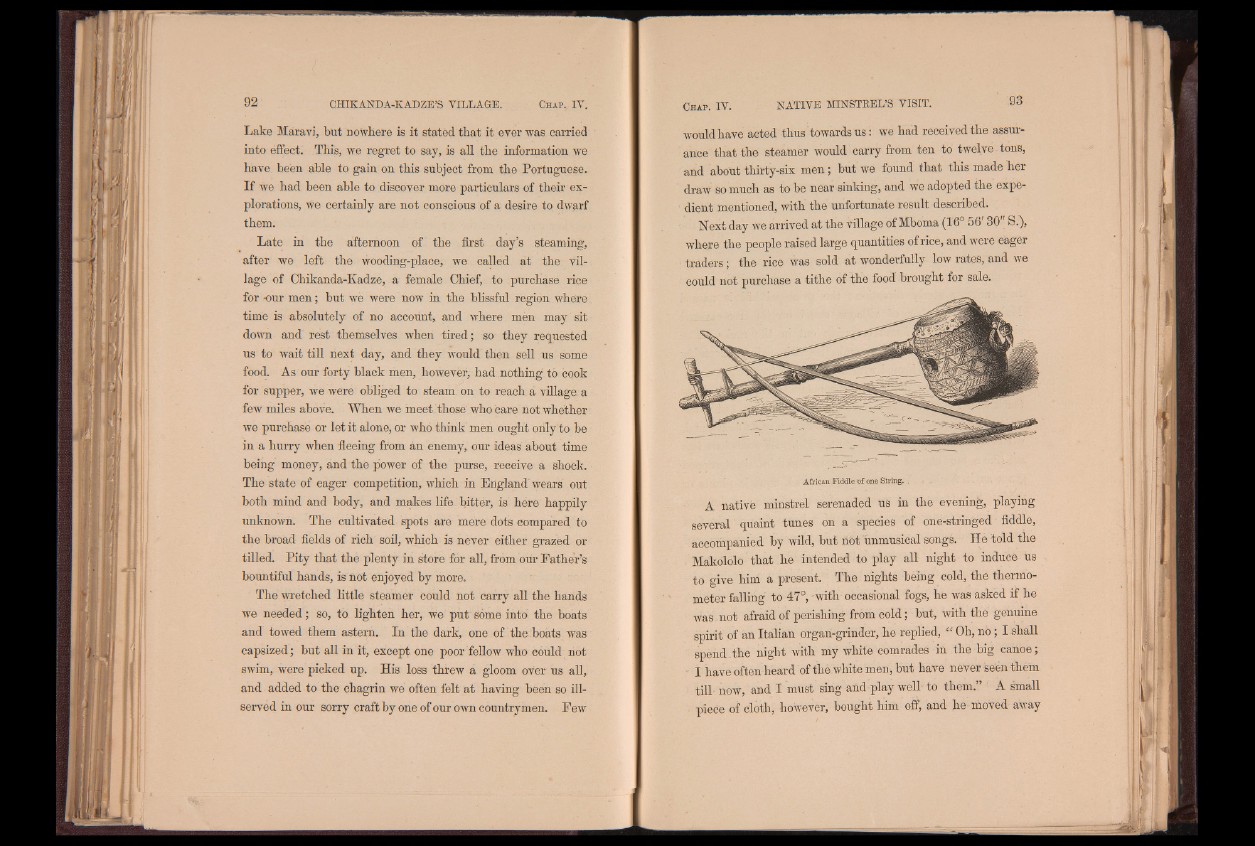
Lake Maravi, but nowhere is it stated that it ever was carried
into effect. This, we regret to say, is all the information we
have been able to gain on this subject from the Portuguese.
I f we had been able to discover more particulars of their explorations,
we certainly are not conscious of a desire to dwarf
them.
Late in the afternoon of the first day’s steaming,
after we left the wooding-place, we called at the village
of Chikanda-Kadze, a female Chief, to purchase rice
for our men; but we were now in the blissful region where
time is absolutely of no account, and where men may sit
down and rest themselves when tired; so they requested
us to wait till next day, and they would then sell us some
food. As our forty black men, however, had nothing to cook
for supper, we were obliged to steam on to reach a village a
few miles above. When we meet those who care not whether
we purchase or let it alone, or who think men ought only to be
in a hurry when fleeing from an enemy, our ideas about time
being money, and the power of the purse, receive a shock.
The state of eager competition, which in England wears out
both mind and body, and makes life bitter, is here happily
unknown. The cultivated spots are mere dots compared to
the broad fields of rich soil, which is never either grazed or
tilled. Pity that the plenty in store for all, from our Father’s
bountiful hands, is not enjoyed hy more.
The wretched little steamer Could not carry all the hands
we needed; so, to lighten her, we put some into the boats
and towed them astern. In the dark, one of the boats was
capsized; but all in it, except one poor fellow who could not
swim, were picked up. His loss threw a gloom over us all,
and added to the chagrin we often felt at having been so ill-
served in our sorry craft by one of our own countrymen. Few
would have acted thus towards us: we had received the assurance
that the steamer would carry from ten to twelve tons,
and about thirty-six men; but We found that this made her
draw so much as to be near sinking, and we adopted the expedient
mentioned, with the unfortunate result described.
Next day we arrived at the village of Mboma (16° 56' 30" S.),
where the people raised large quantities of rice, and were eager
traders; the rice was sold at wonderfully low rates, and we
could not purchase a tithe of the food brought for sale.
African Fiddle of one String. .
A native minstrel serenaded us in the evening, playing
several quaint tunes on a species of one-stringed fiddle,
accompanied by wild, but not "unmusical songs. He told the
Makololo that he intended to play all night to induce us
to give him a present. The nights being cold, the thermometer
falling to 47°, with occasional fogs, he was asked if he
was-not afraid of perishing from cold; but, with the genuine
spirit of an Italian organ-grinder, he replied, “ Oh, n o ; I shall
spend.the night with my white comrades in the big canoe;
I h a v e o f t e n heard of the white menj but have never seen them
till now, and I must sing and play well to them.” A small
piece of cloth, however, bought him off, and he- moved away